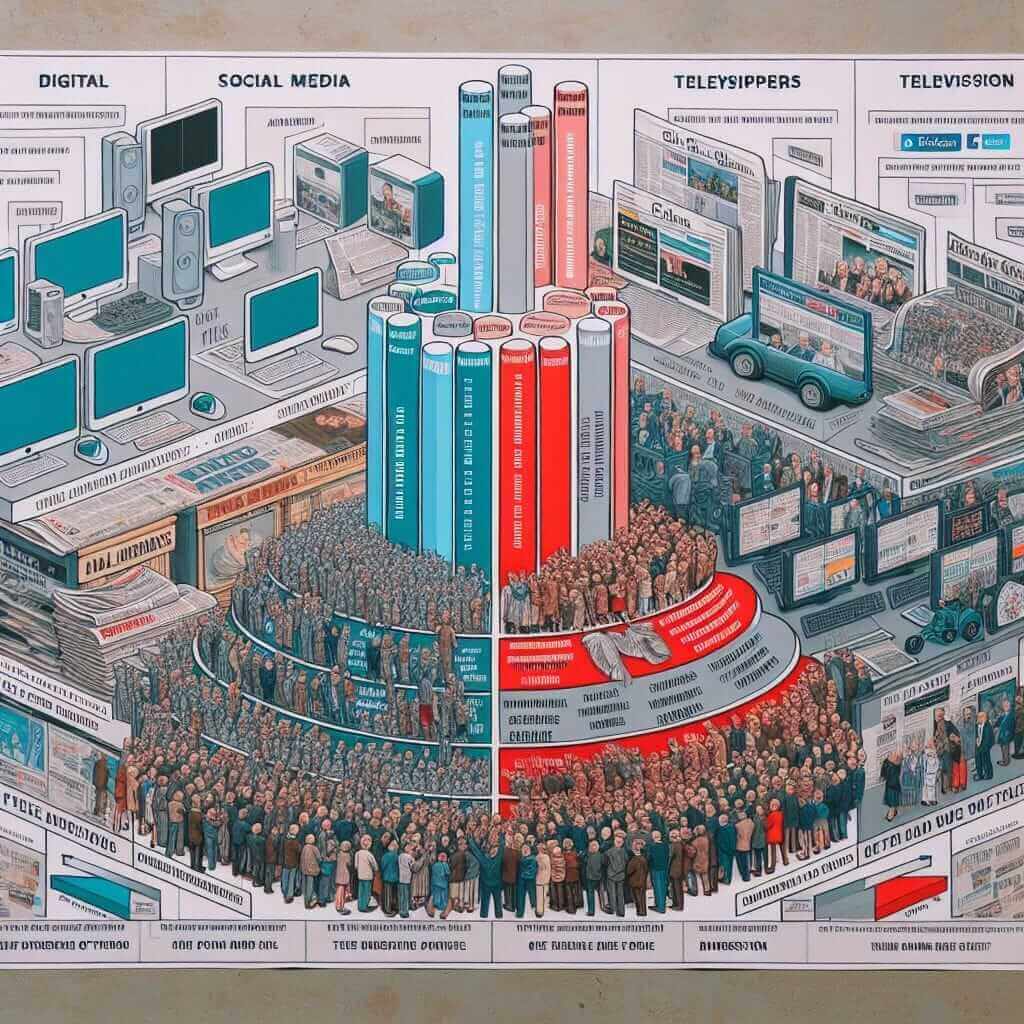The Reading component of the IELTS exam often features contemporary and highly relevant topics. One such topic that has gained prominence in the past few years is “How is the rise of digital platforms affecting traditional media?” Given its relevance and the shift in media consumption habits, this subject is likely to appear frequently in the IELTS Reading test. Understanding this topic can also help test-takers stay informed about current trends and significantly improve their reading skills.
To help you prepare, we have created an IELTS Reading practice test that closely mimics the format and difficulty level of real IELTS exams. This exercise serves to familiarize you with the types of texts and questions you may encounter, equipping you with valuable skills and strategies.
Practice Reading Test: Medium Text
Passage: How Digital Platforms are Transforming Traditional Media
The transformation of media in the digital age has been monumental, with digital platforms significantly impacting traditional media forms such as newspapers, magazines, radio, and television. This shift, driven by technological advancements and changing consumer preferences, has brought about both opportunities and challenges for traditional media outlets.
Traditional media, which once held a near-monopoly over information dissemination, now faces fierce competition from digital platforms. The internet and social media have democratized information, allowing anyone with a connection to produce and share content. This has resulted in a greater diversity of voices and perspectives, but it has also led to the proliferation of misinformation and the erosion of journalistic standards.
Another significant impact of digital platforms on traditional media is the change in advertising revenue. Advertisers have followed audiences to digital platforms, which offer more targeted and efficient advertising options. As a result, traditional media outlets have seen a significant decline in advertising revenue, leading to downsizing, layoffs, and even closures in some cases.

Moreover, digital platforms have changed the way people consume media. Audiences now demand instant, on-demand content accessible via their smartphones and tablets. This has forced traditional media companies to adapt their strategies, often by creating their digital content and investing in their online presence.
Despite these challenges, traditional media continues to hold a place in the digital landscape. Established brands with a reputation for credible and reliable journalism are leveraging digital technologies to reach broader audiences. By embracing multimedia content, podcasts, and video streams, they can remain relevant in an increasingly digital world.
Overall, the rise of digital platforms has undoubtedly transformed traditional media, pushing it towards innovation while highlighting the need for sustaining quality journalism and credible information sources.
Questions
Multiple Choice
-
What has significantly impacted traditional media forms such as newspapers and magazines?
a) Decreased literacy rates
b) Rise of digital platforms
c) Government regulations
d) Economic downturns -
One of the advantages of digital platforms mentioned in the passage is:
a) Increased revenue for traditional media
b) Greater diversity of voices
c) Lower advertising costs
d) Enhanced print quality
True/False/Not Given
-
Digital platforms have entirely replaced traditional media.
- True
- False
- Not Given
-
Traditional media no longer maintains a presence in the market.
- True
- False
- Not Given
Matching Information
- Match the following statements to the paragraphs (A, B, C, D, E) in which they are found:
a) The internet’s role in democratizing information.
b) The decline in advertising revenue for traditional media.
c) The way audiences demand content.
Summary Completion
- Complete the summary with suitable words from the passage.
The rise of digital platforms has (i) __ traditional media, affecting information (ii) __ and advertising (iii) _____. While it provides diverse (iv) __, it also contributes to (v) __. Traditional media must (vi) __ and innovate to stay relevant.
Answer Key and Explanations
Multiple Choice
- b) Rise of digital platforms
- b) Greater diversity of voices
True/False/Not Given
- False – The passage states that traditional media continue to hold a place in the digital landscape.
- False – It specifies that traditional media remain in the market by leveraging digital technologies.
Matching Information
-
- a) Paragraph B
- b) Paragraph C
- c) Paragraph D
Summary Completion
- i) transformed
ii) dissemination
iii) revenue
iv) perspectives
v) misinformation
vi) adapt
Lessons Learned
Common mistakes to avoid when doing passages similar to “How is the rise of digital platforms affecting traditional media?” include:
- Misinterpreting the main idea or key points due to skim-reading.
- Overlooking contextual clues that help discern true/false/not given statements.
- Confusing detailed information and general ideas when matching statements to paragraphs.
Vocabulary
- Monumental (adj.) /ˌmɒn.jʊˈmen.təl/: Extremely significant or important.
- Democratize (v.) /dɪˈmɒk.rə.taɪz/: Make something accessible to everyone.
- Proliferation (n.) /prəˌlɪf.ərˈeɪ.ʃən/: Rapid increase in numbers.
Grammar Point
- Present Perfect Tense: Used to describe actions that have occurred at an unspecified time before now and are still relevant.
- Example: “Digital platforms have transformed traditional media.”
- Structure: [Subject] + “have/has” + [Past Participle].
Tips for High IELTS Reading Scores
- Engage in regular practice with realistic test scenarios.
- Focus on skimming and scanning techniques to locate information quickly.
- Expand your vocabulary and understanding of complex grammar structures.
- Develop critical thinking to analyze and differentiate between similar pieces of information.